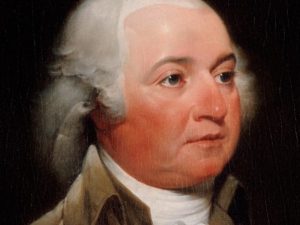[iframe style=”border:none” src=”http://html5-player.libsyn.com/embed/episode/id/4077680/height/90/width/480/thumbnail/no/render-playlist/no/theme/custom/custom-color/1e73be” height=”90″ width=”480″ scrolling=”no” allowfullscreen webkitallowfullscreen mozallowfullscreen oallowfullscreen msallowfullscreen]

Some of you may know that I am studying our early Presidents and the characteristics of their leadership. Currently I’m reading David McCullough’s biography on John Adams. I highly recommend this work as well as McCullough’s other works. I can personally recommend his book, 1776, which tells the story of that pivotal year in American history and provides insights into the leadership skills of many of the characters of that time.
Today I find myself thinking a lot about the hard lessons of leadership that I am learning from John Adams. Adams was a leader who earned the dislike of many. He was a hard man in many aspects. His convictions were held firmly and he had very little patience for the silliness and political maneuvering of other men of his day. He was particularly disliked by The Comte de Vergennes. Vergennes was the French Foreign Minister serving Louis XVI during the American revolution. His dislike for Adams was so strong that during Adams’ second tour in France as an American ambassador he informed both Adams and Benjamin Franklin that he would no longer receive Adams, read his letters or engage with him at any level.
Adams was thought to be too obstinate and lacking in the diplomatic skills necessary to perform the duties of a diplomat. Franklin seems to have shared these feelings, and Thomas Jefferson, Adams’ friend and political rival clearly believed in a much more conciliatory approach to diplomacy and was quite uncomfortable at times with Adams’ direct and even abrasive forms of leadership and diplomacy.
Vergennes is reported to say of Adams’ His obstinacy…will cause him to foment a thousand unfortunate incidents.” Adams illustrates his own obstinacy by stating “Thanks to God that he gave me stubbornness when I know I am right.” It was his obstinacy, or perhaps we should call it unwavering convictions, that moved and enable Adams to achieve so much for his country and even for his family. He regularly said unpopular things, made unpopular decisions, and took unpopular actions, taking great personal risks in the process.[1]
Realizing there was nothing for him to do in France and possessing a strong conviction that a Dutch alliance and a loan from the Dutch was necessary for American success in the war with England, Adams traveled to the Netherlands as a private citizen to begin to pursue those ends. He had no instructions or authority from Congress for this mission, so the expense was his alone and the ability to achieve his ends was severally limited. Nevertheless, his convictions drove him forward. He worked tirelessly building relationships and promoting his vision and soon received the authority and commission necessary from Congress. But the road was not easy. The Dutch, ever fearful of war with England, were reluctant to even meet with Adams let alone entertain an alliance and the associated loans.
Diplomats like Franklin and Vergennes would have moved slowly, greasing the wheels of diplomacy with political maneuvering and manipulation, thus wooing the Dutch into an alliance, but Adams did not seem to stomach such political tactics, nor did he sense the luxury of time to move slowly, so he wrote a letter to the Dutch, a powerful letter, a letter that the French ambassador in the Netherlands urged Adams to abandon as ill-advised. Adams’ response was to own the danger, the responsibility, and the importance of his course. He compared the difference of his unconventional approach to the proper diplomatic approach as like the difference between waging war with a militia verses with a regular army. Sometimes the militia is what is needed, and sometimes it is the militia that carries the day. Case in point: Lexington and Concord[2].
Well, what are we to learn from John Adams of the art of leadership? Here are a few points to consider.
- Leadership often requires one to say and do unpopular things, and this requires courage
- Leadership often requires one to move with a current opposed to conventional wisdom, and this requires conviction
- Leadership often requires one to act in ways opposed to one’s own happiness, comfort, and safety, and this requires contentment
A leader must be courageous enough to say and do the things required even when others of great esteem and respectability counsel otherwise. A leader must act with strong convictions that what he is about is right and good otherwise he will be easily dissuaded from his course. A leader must be content in life in order to endure the suffering that leadership so often imposes.
So, let’s follow Mr. Adams’ example. Let’s be courageous, let’s hold strong convictions, and let’s be content to accept any personal suffering experienced to achieve the good ends at which we aim.

Thanks for this, Mark. The term “rugged individualism” comes to mind… People who get on in this world have their own agenda, don’t they? Your post also reminded me of a phrase I heard which states that most failures in leadership are the result of failure in character. Adams proved that the same can be said of success.
Mark, thanks, as always, for your comment. Yes, “rugged individualism” my be appropriate but only in so far as that a leader is a rugged individual for the benefit of others. Adams went his way with conviction because he believed that doing so served his country better than some other way. He was driven to serve Americans, and this gave him the courage to lead with conviction and endure hardship.